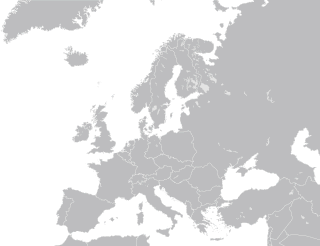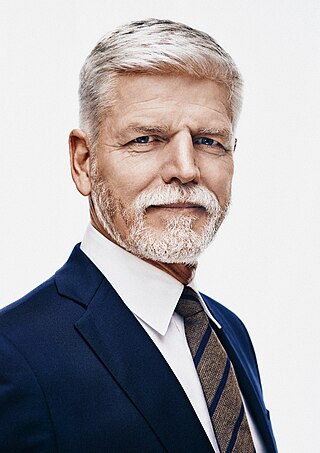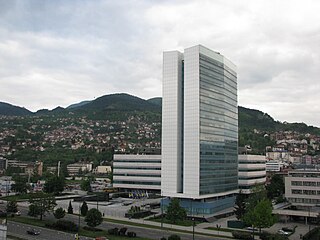Related Research Articles

The Czech Armed Forces, also known as the Czech Army, is the military service responsible for the defence of the Czech Republic as part of the Armed Forces of the Czech Republic alongside the Military Office of the President of the Republic and the Castle Guard. The army consists of the General Staff, the Land Forces, the Air Force and support units.

The Kosovo War was an armed conflict in Kosovo that lasted from 28 February 1998 until 11 June 1999. It was fought between the forces of the Federal Republic of Yugoslavia (FRY), which controlled Kosovo before the war, and the Kosovo Albanian separatist militia known as the Kosovo Liberation Army (KLA). The conflict ended when the North Atlantic Treaty Organization (NATO) intervened by beginning air strikes in March 1999 which resulted in Yugoslav forces withdrawing from Kosovo.

The North Atlantic Treaty Organization, also called the North Atlantic Alliance, is an intergovernmental transnational military alliance of 32 member states—30 European and 2 North American. Established in the aftermath of World War II, the organization implements the North Atlantic Treaty, signed in Washington, D.C., on 4 April 1949. NATO is a collective security system: its independent member states agree to defend each other against attacks by third parties. During the Cold War, NATO operated as a check on the threat posed by the Soviet Union. The alliance remained in place after the dissolution of the Soviet Union and the Warsaw Pact, and has been involved in military operations in the Balkans, the Middle East, South Asia, and Africa. The organization's motto is animus in consulendo liber. The organization's strategic concepts include deterrence.
The legitimacy under international law of the 1999 NATO bombing of the Federal Republic of Yugoslavia has been questioned. The UN Charter is the foundational legal document of the United Nations (UN) and is the cornerstone of the public international law governing the use of force between States. NATO members are also subject to the North Atlantic Treaty.

The North Atlantic Treaty Organization (NATO) carried out an aerial bombing campaign against the Federal Republic of Yugoslavia during the Kosovo War. The air strikes lasted from 24 March 1999 to 10 June 1999. The bombings continued until an agreement was reached that led to the withdrawal of the Yugoslav Army from Kosovo, and the establishment of the United Nations Interim Administration Mission in Kosovo, a UN peacekeeping mission in Kosovo. The official NATO operation code name was Operation Allied Force whereas the United States called it Operation Noble Anvil ; in Yugoslavia the operation was incorrectly called Merciful Angel, possibly as a result of a misunderstanding or mistranslation.

The Yugoslav Wars were a series of separate but related ethnic conflicts, wars of independence, and insurgencies that took place from 1991 to 2001 in what had been the Socialist Federal Republic of Yugoslavia. The conflicts both led up to and resulted from the breakup of Yugoslavia, which began in mid-1991, into six independent countries matching the six entities known as republics that had previously constituted Yugoslavia: Slovenia, Croatia, Bosnia and Herzegovina, Montenegro, Serbia, and Macedonia. SFR Yugoslavia's constituent republics declared independence due to unresolved tensions between ethnic minorities in the new countries, which fueled the wars. While most of the conflicts ended through peace accords that involved full international recognition of new states, they resulted in a massive number of deaths as well as severe economic damage to the region.

Miloš Zeman is a Czech politician who served as the third president of the Czech Republic from 2013 to 2023. He also previously served as the prime minister of the Czech Republic from 1998 to 2002. As leader of the Czech Social Democratic Party from 1993 to 2001, he is credited with the revival of the party into one of the country's major political forces. Zeman briefly served as the President of the Chamber of Deputies from 1996 to 1998.

Miroslav Lazanski was а Serbian journalist, military analyst, politician, and a diplomat who served as ambassador of Serbia to the Russian Federation. Previous to his appointment, Lazanski was a Member of parliament. He wrote on political and military matters and was a correspondent and commentator for the Belgrade daily Politika. He was a member of the National Assembly of Serbia from 2016 to 2019 as member of the governing coalition led by the Serbian Progressive Party.

The Scorpions were a Serb paramilitary unit active during the Yugoslav Wars. The unit was involved in war crimes during the wars in Croatia, Bosnia and Herzegovina, and Kosovo. After the wars, four members of the unit were found guilty of killing six prisoners during the Srebrenica massacre of July 1995 and five were found guilty of killing fourteen civilians, mostly women and children, during the Podujevo massacre in March 1999.

NATO is a military alliance of thirty-two European and North American countries that constitutes a system of collective defense. The process of joining the alliance is governed by Article 10 of the North Atlantic Treaty, which allows for the invitation of "other European States" only and by subsequent agreements. Countries wishing to join must meet certain requirements and complete a multi-step process involving political dialogue and military integration. The accession process is overseen by the North Atlantic Council, NATO's governing body. NATO was formed in 1949 with twelve founding members and has added new members ten times. The first additions were Greece and Turkey in 1952. In May 1955, West Germany joined NATO, which was one of the conditions agreed to as part of the end of the country's occupation by France, the United Kingdom, and the United States, prompting the Soviet Union to form its own collective security alliance later that month. Following the end of the Franco regime, newly democratic Spain chose to join NATO in 1982.

Czech Republic–Russia relations are the bilateral foreign relations between the Czech Republic and the Russian Federation. Relations have substantially deteriorated in recent years due to events such as the Russian annexation of Crimea in 2014, Russian sabotage of Czech ammunition depot in Vrbětice in 2014, poisoning of Sergei Skripal in 2018 and Russian invasion of Ukraine in 2022.

Armenia and Serbia maintain diplomatic relations established between Armenia and the Federal Republic of Yugoslavia on 14 January 1993. Both countries are members of the United Nations, Council of Europe, Organization for Security and Co-operation in Europe, NATO's Partnership for Peace, the International Monetary Fund, and the International Bank for Reconstruction and Development.

Numerous war crimes were committed by all sides during the Kosovo War, which lasted from 28 February 1998 until 11 June 1999. According to Human Rights Watch, the vast majority of abuses were attributable to the government of Slobodan Milošević, mainly perpetrated by the Serbian police, the Yugoslav army, and Serb paramilitary units. During the war, regime forces killed between 7,000–9,000 Kosovar Albanians, engaged in countless acts of rape, destroyed entire villages, and displaced nearly one million people. The Kosovo Liberation Army has also been implicated in atrocities, such as kidnappings and summary executions of civilians. Moreover, the NATO bombing campaign has been harshly criticized by human rights organizations and the Serbian government for causing roughly 500 civilian casualties.

Serbia, as a constituent subject of the SFR Yugoslavia and later the FR Yugoslavia, was involved in the Yugoslav Wars, which took place between 1991 and 1999—the war in Slovenia, the Croatian War of Independence, the Bosnian War, and Kosovo. From 1991 to 1997, Slobodan Milošević was the President of Serbia. The International Criminal Tribunal for the former Yugoslavia (ICTY) has established that Milošević was in control of Serb forces in Bosnia and Herzegovina and Croatia during the wars which were fought there from 1991 to 1995.

Petr Pavel is a Czech politician and retired army general, currently serving as the president of the Czech Republic since March 2023. Prior to this, he held the position of Chairman of the NATO Military Committee from 2015 to 2018, and served as the Chief of the General Staff of the Czech Armed Forces between 2012 and 2015.
The Evacuation of Karin Base occurred in January 1993 around Karin, Croatia. A unit of Czech and Slovak soldiers evacuated French soldiers of the UNPROFOR mission, who were surrounded by the Croatian and Serbian units during the Croatian War of Independence.

The reaction in Greece to the Yugoslav Wars refers to the geopolitical relations between Greece and the countries that emerged from the breakup of Yugoslavia as a result of the Yugoslav Wars, as well as the international stance of the former during the years of the conflict in terms of activities by state and non-state actors.

The Serbian Party Oathkeepers, commonly known as just Oathkeepers, is a far-right political party in Serbia. Milica Đurđević Stamenkovski has been the party's president since 2021.

Jan Lipavský is a Czech politician and information technology manager who has been serving as Minister of Foreign Affairs of the Czech Republic since December 2021, in the Cabinet of Petr Fiala. A former member of the Czech Pirate Party, he was a member of the Chamber of Deputies from October 2017 to October 2021.

"On conducting a special military operation" was a televised broadcast by Russian president Vladimir Putin on 24 February 2022, announcing the Russian invasion of Ukraine.
References
- 1 2 3 Obrtel, Marek (22 December 2014). "Marek Obrtel: Hluboce se stydím za zločineckou organizaci, jakou je NATO. Vracím vyznamenání". parlamentnilisty.cz. Retrieved 5 May 2023.[ unreliable source ]
- 1 2 Johnston, Raymond (30 December 2014). "Army doctor to return medals in protest against NATO". Prague Post. No. 30 December 2014. Czech News Agency. Retrieved 31 December 2014.
- 1 2 3 "Czech NATO veteran ashamed of medals, wants to return them". InSerbia News. No. 29 December 2014. InSerbia Network Foundation. 29 December 2014. Archived from the original on 31 December 2014.
- 1 2 3 4 5 "Marek Obrtel". 2021.programydovoleb.cz. Retrieved 5 May 2023.
- ↑ "First Czechs in ISAF". www.army.cz/. Ministry of Defense & Armed Forces of the Czech Republic. Retrieved 31 December 2014.
- 1 2 "Bývalý vojenský lékař vrací metály. NATO je prý zločinecká organizace". iDNES.cz (in Czech). 29 December 2014. Retrieved 5 May 2023.
- 1 2 Smolenová, Ivana (20 December 2015). "Is Pro-Russian Propaganda Fueling Czech and Slovak Paramilitary Groups?". StopFake. Retrieved 4 May 2023.
- 1 2 3 4 Zgut, Edit; Győri, Lóránt (April 2017). "The Russian connections of far-right and paramilitary organizations in the Czech Republic" (PDF). Political Capital. pp. 32–34. Retrieved 3 May 2023.
- 1 2 Hampl, Alexandr. "Propaganda v uniformě. Českoslovenští vojáci s Ruskem proti Západu a uprchlíkům". ČT24 (in Czech). Czech Television . Retrieved 4 May 2023.
- ↑ "NATO Veteran: I Witnessed The Genocide Against Serbs In Kosovo". InSerbia News. InSerbia Network Foundation. 13 January 2015. Archived from the original on 13 January 2015.
- ↑ Bjørgo, Tore; Mareš, Miroslav (18 October 2019). "Vigilantism against Migrants and Minorities". Routledge Studies in Fascism and the Far Right.
- ↑ Hassan, Vít (18 November 2016). "Right-wing extremists supporting Czech President blocked from marching through Prague's Jewish Town on 17 November". Romea.cz - Vše o Romech na jednom místě (in Czech). Retrieved 5 May 2023.
- ↑ "Marek Obrtel, Zastupitelstva obcí 2018, Rokytnice - Výsledky voleb". volby.kurzy.cz (in Czech). Retrieved 5 May 2023.